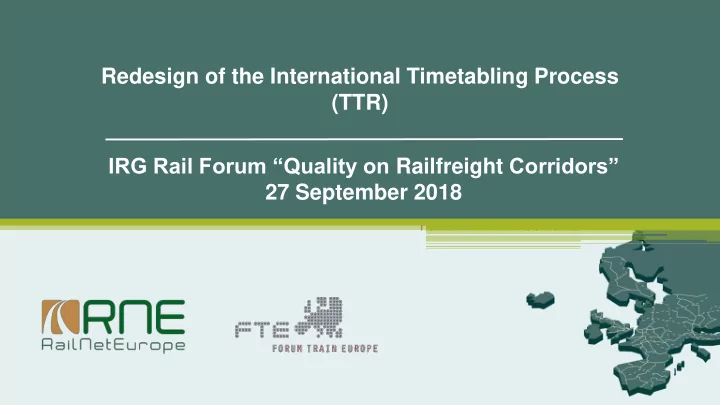

Redesign of the International Timetabling Process (TTR) IRG Rail Forum “Quality on Railfreight Corridors” 27 September 2018
2 The need for a redesigned TT process • Out-dated timetabling process • One static path request deadline does not fit to various market needs (e.g. freight traffic) • Lack of harmonisation and cooperation • Increasing national constraints • Problem of coordination of works 2014 2015 2016 2017 2018 2019 2020 2021 2022 2023 2024 2025
3 TTR Approach Joint project to redesign complete TT process by RNE and FTE (with support of ERFA) First step: Start with a blank piece of paper - Ask RUs and applicants for their requirements - IMs design the process based on inputs and feasibility checks - RUs, applicants and IMs agree on the process Second step: Compare with current situation - How to use and improve existing process elements? - Which new elements need to be introduced? 2014 2015 2016 2017 2018 2019 2020 2021 2022 2023 2024
4 Timeline of TTR creation 2014 : RNE and FTE joined forces to reconsider the path allocation process for freight traffic (supported by ERFA): Start of the TTR project 2015 : New scope: The complete capacity approach 2017 : RNE and FTE approval of the redesigned timetabling process and start of implementation; TTR results considered in recast Annex VII of Directive 2012/34 2014 2015 2016 2017 2018 2019 2020 2021 2022 2023 2024 2025
5 The redesigned timetabling process • TTR is a new capacity planning and allocation process, created by the railway sector, which is: • Market oriented • Efficient • Reliable
6 Rolling Planning • Rolling Planning request at any time between 4 and 1 month before the first operation day valid for any period of time (max. 36 months) Answers based on safeguarded capacity TT 202. TT 202. +1 TT 202. +2 TT 202. +3 TT 202. +4 Operation Operation Operation
7 Benefits of TTR for the sector • Benefits detected in Business Case: The complete implementation of all components will provide access to large financial benefits due to: • Improved usage of available infrastructure (increased capacity/quality) and subsequent higher marked share of railways in the modal split • Increased efficiency of IMs and applicants when planning and allocating capacity with minimization of redundant work steps
8 The TTR vision • Clear focus on freight and passenger market needs with optimised request deadlines • Improved reliability, consistency and stability incl. planning and execution of Temporary Capacity Restrictions (TCRs) • Binding implementation and application of the redesigned timetabling process TTR • Improvement of efficiency (capacities, resources, IT) in order to avoid multiple planning/work • Making best use of existing Infrastructure capacity The goal is the implementation of the complete process (i.e. all process components as agreed by RNE and FTE) latest by the end of 2024 (Timetable 2025)
9 Timetable period 2020 - 3 pilot lines run a first test of innovative TTR elements - Rough timeline: - Creation of capacity model (2018) - Capacity publication and path requests (2019) - Active timetable with further requests (2020) 2014 2015 2016 2017 2018 2019 2020 2021 2022 2023 2024 2025
10 First successes of running pilots • Successful cooperation between RUs/applicants and IMs • Near completion of the Capacity Models • Removal of insufficiencies in cooperation between IMs • First IT systems for displaying capacity under development 2014 2015 2016 2017 2018 2019 2020 2021 2022 2023 2024 2025
11 TTR Pilots: Contacts • If you have further questions regarding the first 3 pilot lines, you may get in contact with: • Mannheim – Miranda de Ebro > Mr Michel Dupuis • Antwerp – Rotterdam > Mr Freddy Van Der Cruyssen or Mr Floris Visser • Munich – Verona > Mr Andri Kopperschmidt Contact details to be found on http://www.rne.eu/sales-timetabling/ttr/ 2014 2015 2016 2017 2018 2019 2020 2021 2022 2023 2024 2025
12 Timetable period 2021 - ÖBB INFRA will pilot TTR on its core network - Neighbouring IMs will be asked to (partially) join the pilot - The existing 3 pilot lines will continue - Implementation of Commercial Conditions - Potential improvement of detected pressure points - Further development of IT systems - Test of multi-annual aspects - Rough timeline: - Creation of capacity model (2019) - Capacity publication and path requests (2020) - Active timetable with further requests (2021) 2014 2015 2016 2017 2018 2019 2020 2021 2022 2023 2024 2025
13 Between timetable periods 2021 and 2024 - Neighbouring IMs will be asked to gradually include their lines in the pilot - Enablers (IT systems, Commercial Conditions and Legal Framework) will be created, adopted and improved simultaneously - Based on findings from previous pilot activities, the process itself will also be improved continuously - Quick wins will be implemented European wide immediately, if feasible 2014 2015 2016 2017 2018 2019 2020 2021 2022 2023 2024 2025
14 Starting timetable period 2025 - Starting with timetable period 2025, TTR will be fully implemented - Therefore, all preconditions shall be available by the end of 2024: - IT Systems - Commercial Conditions and Allocation Rules - Legal framework 2014 2015 2016 2017 2018 2019 2020 2021 2022 2023 2024 2025
15 Successful implementation of TTR • Critical changes must be supported: • Creation of Commercial Conditions to steer the process • Allowing/enforcing implementation of components (e.g. safeguarding capacity) • Financing must be ensured (funding/sector) • Pragmatic legal solutions are required (e.g. FCA, Annexes to Directives similar to Annex VII of Directive 2012/34 regarding TCRs) • No national particularities • The alternative ‘status quo’ is no solution! Railways’ success on the market can only be achieved by applying competitive planning and production processes.
16 Thank you! TTR Deputy Programme Manager TTR Programme Manager Peter Jäggy Philipp Koiser Acting FTE Secretary General RNE Sales & Timetabling Manager +41 79 760 82 66 +43 1 907 62 72 15 peter.jaeggy@forumtraineurope.eu philipp.koiser@rne.eu
Recommend
More recommend